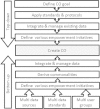A conceptual approach to a citizens' observatory--supporting community-based environmental governance
- PMID: 25495204
- PMCID: PMC4320485
- DOI: 10.1186/1476-069X-13-107
A conceptual approach to a citizens' observatory--supporting community-based environmental governance
Abstract
In recent years there has been a trend to view the Citizens' Observatory as an increasingly essential tool that provides an approach for better observing, understanding, protecting and enhancing our environment. However, there is no consensus on how to develop such a system, nor is there any agreement on what a Citizens' Observatory is and what results it could produce. The increase in the prevalence of Citizens' Observatories globally has been mirrored by an increase in the number of variables that are monitored, the number of monitoring locations and the types of participating citizens. This calls for a more integrated approach to handle the emerging complexities involved in this field, but before this can be achieved, it is essential to establish a common foundation for Citizens' Observatories and their usage. There are many aspects to a Citizens' Observatory. One view is that its essence is a process that involves environmental monitoring, information gathering, data management and analysis, assessment and reporting systems. Hence, it requires the development of novel monitoring technologies and of advanced data management strategies to capture, analyse and survey the data, thus facilitating their exploitation for policy and society. Practically, there are many challenges in implementing the Citizens' Observatory approach, such as ensuring effective citizens' participation, dealing with data privacy, accounting for ethical and security requirements, and taking into account data standards, quality and reliability. These concerns all need to be addressed in a concerted way to provide a stable, reliable and scalable Citizens' Observatory programme. On the other hand, the Citizens' Observatory approach carries the promise of increasing the public's awareness to risks in their environment, which has a corollary economic value, and enhancing data acquisition at low or no cost. In this paper, we first propose a conceptual framework for a Citizens' Observatory programme as a system that supports and promotes community-based environmental governance. Next, we discuss some of the challenges involved in developing this approach. This work seeks to initiate a debate and help defining what is the Citizens' Observatory, its potential role in environmental governance, and its validity as a tool for environmental research.
Figures



References
-
- Sadik S: What is environment?http://shadmansadik.blogspot.no/search/label/Environmental%20Geography
-
- McGlade J: Global citizen observatory - The role of individuals in observing and understanding our changing world.http://www.eea.europa.eu/media/speeches/global-citizen-observatory-the-r...
-
- Lanfranchi V, Ireson N, When U, Wrigley SN, Fabio C. Citizens’ Observatories for Situation Awareness in Flooding. In: Hiltz SR, Pfaff MS, Plotnick L, Shih PC, editors. Proceedings of the 11th International Conference on Information Systems for Crisis Response and Management (ISCRAM 2014): 18-21 May 2014. Pennsylvania, USA: University Park; 2014. pp. 145–154.
-
- Copernicus: Global monitoring for environment and security.http://www.copernicus.eu
-
- GEOSS: Global earth observation system of systems.http://www.epa.gov/geoss
Publication types
MeSH terms
LinkOut - more resources
Full Text Sources
Other Literature Sources

